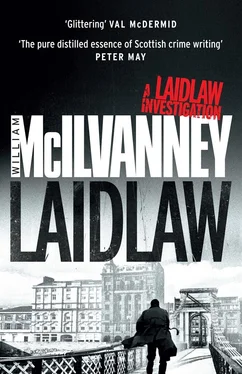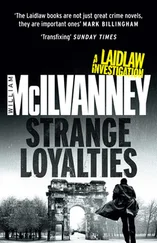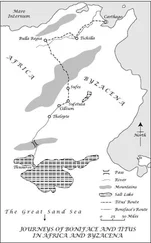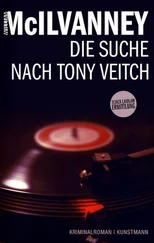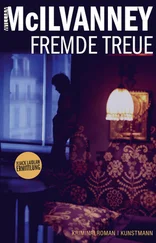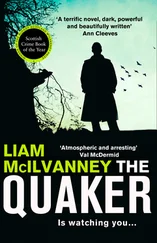William McIlvanney - Laidlaw
Здесь есть возможность читать онлайн «William McIlvanney - Laidlaw» весь текст электронной книги совершенно бесплатно (целиком полную версию без сокращений). В некоторых случаях можно слушать аудио, скачать через торрент в формате fb2 и присутствует краткое содержание. Год выпуска: 1977, ISBN: 1977, Издательство: Sceptre, Жанр: Полицейский детектив, на английском языке. Описание произведения, (предисловие) а так же отзывы посетителей доступны на портале библиотеки ЛибКат.
- Название:Laidlaw
- Автор:
- Издательство:Sceptre
- Жанр:
- Год:1977
- ISBN:0857869868
- Рейтинг книги:5 / 5. Голосов: 1
-
Избранное:Добавить в избранное
- Отзывы:
-
Ваша оценка:
- 100
- 1
- 2
- 3
- 4
- 5
Laidlaw: краткое содержание, описание и аннотация
Предлагаем к чтению аннотацию, описание, краткое содержание или предисловие (зависит от того, что написал сам автор книги «Laidlaw»). Если вы не нашли необходимую информацию о книге — напишите в комментариях, мы постараемся отыскать её.
Laidlaw — читать онлайн бесплатно полную книгу (весь текст) целиком
Ниже представлен текст книги, разбитый по страницам. Система сохранения места последней прочитанной страницы, позволяет с удобством читать онлайн бесплатно книгу «Laidlaw», без необходимости каждый раз заново искать на чём Вы остановились. Поставьте закладку, и сможете в любой момент перейти на страницу, на которой закончили чтение.
Интервал:
Закладка:
The telephone rang. Ena answered. Laidlaw hoped it wasn’t for him, but it was.
‘What happened next?’ he said to the children as he went through.
It was the Commander of the Crime Squad telling him there had been a girl’s body found in Kelvingrove Park. Milligan of Central Division would be the D.I. for the main investigation. But Laidlaw was to help. What it meant to him first of all was the reaction Ena would inevitably have. He wasn’t disappointed. She was in the kitchen. He closed the door so that the children wouldn’t hear, passing off their pleas for a solution with ‘Later’.
‘There’s been a murder,’ he said.
Ena paused over the vegetables she was chopping for Monday’s soup. She was staring straight ahead at the striated glass of the cabinet.
‘All I want is a nice, uninterrupted Sunday,’ she said.
‘I know.’
‘No you don’t. You don’t know at all. What the hell do I care who’s been murdered? My children need a father.’
‘Oh, come on,’ Laidlaw said. ‘Don’t try to attack me on that front. My relationship with them’s made of steel. It’s not at hazard, and you know it.’
‘Do I? Do they? You say you know. Do you know what this kind of thing does to me? To the whole family? I mean, how often does this happen? What’s happening to us is a crime, too. But then you know.’
Ena was waving the knife about distractedly.
‘Yes, I know. I also know the difference between Hedda Gabler and East Lynne. And you are “East Lynne”, missus. You want to live as if the rest of the world was just a necessary evil. Somebody is fucking dead. That may be a nuisance to you. But it’s a fucking sight worse for them.’
He realised he had been shouting.
‘Don’t swear. The children can hear you.’
‘Fuck off! Swear-words they’ll survive. What they might not survive is your indifference to everybody else but them.’
He gave the children hurried kisses like bruises on the way out. They didn’t speak. In the car he was still as tight as a fist. It was getting worse. They quarrelled in short-hand now. Their tolerance of each other had almost completely eroded. Alone in the car, he could admit the injustice of what both of them had said. Over the years they had developed a savage directness, because each had come to understand that the other stood for what couldn’t be agreed to. It only took one remark to appear on the horizon and the other knew the waiting mass of unacceptable attitudes to which it was acting as scout.
Laidlaw could acknowledge to himself how disproportionate to the surface of what had happened his anger had been. But he knew the depth of the threat he had really been answering. It was why he felt uncomfortable among the friends they visited. Beyond the small areas they cultivated conversationally, the arbours of friendship, the ornamental clichés, the well laid out preoccupations, lay a desert-tract of silence where the garbage of what didn’t concern them rotted. Occasionally in the street they might catch a glimpse of one of the strange shapes that flitted across that silence or in a newspaper headline hear an echo of the unearthly sounds that haunted its emptiness. But the door that led from them to it was firmly shut. Laidlaw couldn’t keep that door shut. Reality kept kicking it open.
Like today. The drive from Simshill in Cathcart to the Kelvingrove Park was the distance between pretence and fact. He parked the car above the park and walked downhill into it, so that he saw the scene in a oner. It wasn’t too attractive.
They might have been shooting a film. The cordon formed a semi-circle along the river, the furthest stanchion being maybe seventy yards from the river’s edge. Within that area the police were moving around fulfilling their odd purpose, maggots on the carcase of a murder. A couple had the dogs out. Someone was taking photographs. A man and a boy seemed to be giving statements. People were moving about like bizarre technicians, as if they were tracing a gas-leak.
But they weren’t the most bizarre thing about the scene. That was the crowd beyond the cordon. Laidlaw didn’t like looking at them. They had the strange unity he had noticed in such groups, craning and communing with one another, a hydra talking to itself. A father carried a girl on his shoulders, her feet stirruped in his armpits. A small boy sucked a lollipop. Laidlaw never understood them. It wasn’t as if they could help. They were just voyeurs of disaster.
Not liking being a part of them, he elbowed his way through to the policeman at the rope. Then he turned and shouted, ‘Ticket-holders only!’
‘What’s wrong, sir?’ the policeman asked.
‘Look at them,’ Laidlaw said. ‘What’s that all about? And they probably think this dead lassie is the mystery. They probably think whoever did this is pretty weird.’
‘They’re just curious, sir.’
‘Very.’
‘They’re not so bad.’
‘What Band of Hope do you attend? Don’t leave her alone with them anyway. They’ll be taking a toenail home for the kiddies.’
‘That’s a bit cynical, sir.’
‘Don’t tell me. Tell her.’
He walked towards where she was. She lay blued with what looked like cold. She was partly covered by foliage, like an obscene and inverted parody of what we tell to children. Death found under the gooseberry bush. Her legs were a terrible abandon. Her bruises had congealed on her and blackened thighs and face and belly, and her left breast was charred with them, ash from a bad fire. Against his will, Laidlaw thought of Moya. He remembered the first time of seeing her, battered with her own birth. Hard to come, hard to go. A policeman covered her again with the coat.
‘Oho, it’s Interpol.’
As he looked up, Laidlaw’s eyes went past Milligan to some scene of his own.
‘We’re guaranteed a solution now,’ Milligan persisted.
‘We’ve found the brassière, sir.’
The young policeman held it out towards Milligan. It was yellow with white lace.
‘Christ, it’s a regular paper-chase he’s left us,’ Milligan said. ‘I just hope he keeps it up. Could lead us right to him.’
‘That’s everything except the panties,’ the policeman said.
Laidlaw watched the young policeman put the brassière down beside the other things, the brown shoulder-bag, the yellow platform shoes, the red tee-shirt, the denim trouser-suit. Yes. There was only one other thing to check. He didn’t want to check it because he knew it would be there. He crouched down over the girl, moved back the coat. Her head was skewed at a funny angle on her neck, as if she was listening for something. Gently, he moved the hair back from her forehead. The hair was stiff — surely not with lacquer, Laidlaw thought. It was probably frozen sweat and dust. On her left temple he saw a beauty spot, the one she had thought would spoil her chances. He straightened up.
‘Look,’ he said to Milligan. ‘I think I know who this is. She lives in the Drum. Ardmore Crescent.’
The young policeman was looking at him in awe. Out of such innocent moments legends grow.
‘Bud Lawson’s lassie!’ Milligan said at once. ‘Of course. She hadn’t come home.’
‘That’s right,’ Laidlaw said. ‘I’ve got my car here. I’ll go and fetch him.’
‘McKendrick. You go with him,’ Milligan said. Then turning to Laidlaw, ‘Just in case you forget to tell us something.’
‘I don’t mind telling you anything,’ Laidlaw said. ‘You never understand it anyway. And do you think we could hurry it up? And move her out of the glare.’
‘What glare?’ Milligan asked.
‘Just move her.’
‘Detective Inspector Laidlaw. You know better than that.’
The voice was sonorous with authority. Laidlaw turned and saw the Procurator Fiscal behind the customary barrier of cigar-smoke. It kept out the smell of the world. Today he was giving the park an audience.
Читать дальшеИнтервал:
Закладка:
Похожие книги на «Laidlaw»
Представляем Вашему вниманию похожие книги на «Laidlaw» списком для выбора. Мы отобрали схожую по названию и смыслу литературу в надежде предоставить читателям больше вариантов отыскать новые, интересные, ещё непрочитанные произведения.
Обсуждение, отзывы о книге «Laidlaw» и просто собственные мнения читателей. Оставьте ваши комментарии, напишите, что Вы думаете о произведении, его смысле или главных героях. Укажите что конкретно понравилось, а что нет, и почему Вы так считаете.
